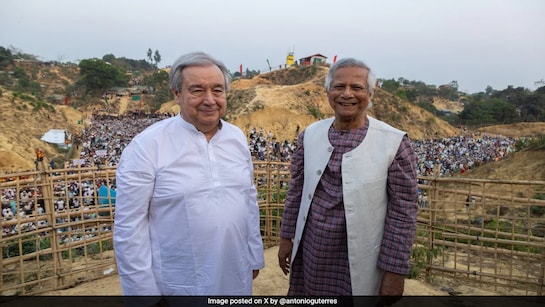
UN Chief, Muhammad Yunus Share Iftar With 1,00,000 Rohingya In Bangladesh
In a remarkable display of solidarity and compassion, United Nations Secretary-General António Guterres and Bangladesh’s Chief Adviser, Professor Muhammad Yunus, shared an iftar meal with approximately 100,000 Rohingya refugees at the Balukhali camp in Ukhiya, Cox’s Bazar, on March 14, 2025. This event underscored the international community’s commitment to supporting one of the world’s most persecuted and vulnerable populations during the holy month of Ramadan.
A Gesture of Solidarity
The iftar, the meal that breaks the daily fast during Ramadan, holds profound significance in the Muslim community. By participating in this ritual with the Rohingya refugees, Guterres and Yunus sent a powerful message of empathy and unity. Guterres remarked, “Every Ramadan, I spend time with Muslim communities living in difficult circumstances, to observe the fast with them and help shine a spotlight on their plight. This year I’m in Bangladesh to express my solidarity with Rohingya refugees and the Bangladeshi people hosting them.”
Highlighting the Plight of the Rohingya
The Rohingya, a predominantly Muslim ethnic group from Myanmar’s Rakhine State, have faced decades of systemic discrimination, statelessness, and targeted violence. Since August 2017, over a million Rohingya have sought refuge in Bangladesh, fleeing atrocities that the United Nations has described as a “textbook example of ethnic cleansing.” The majority reside in sprawling camps in Cox’s Bazar, making it the world’s largest refugee settlement.
Despite the safety offered by Bangladesh, the refugees endure challenging living conditions, with limited access to education, employment, and healthcare. The recent announcement by the World Food Programme (WFP) about potential cuts to food rations due to funding shortages has exacerbated their vulnerabilities. The WFP warned it might reduce monthly rations from $12.50 to $6, raising concerns among aid workers about increased hunger.
International Response and Funding Challenges
The global humanitarian landscape has been strained by multiple crises, leading to donor fatigue and reduced contributions. The WFP’s announcement of potential ration cuts stems from a funding shortfall, not solely due to specific national policy changes. Guterres highlighted the gravity of the situation, stating, “I will be talking to all countries in the world that can support us in order to make sure that funds are made available to avoid a situation in which people would suffer in even more.”
The United States, historically a leading donor for Rohingya aid, has faced its own budgetary constraints, impacting its foreign aid allocations. The WFP has indicated that it requires $15 million in April to maintain full rations for the refugees.
The looming ration cuts have raised alarms among aid workers, who fear that reduced food assistance could lead to increased hunger and malnutrition, especially among children.
Voices from the Camps
The refugees’ testimonies paint a poignant picture of their daily struggles and aspirations. Mohammed Sabir, a 31 … father of five, expressed his desperation: “Whatever we are given now is … .”
Another refugee, Abdur Salam, aged 80, lamented, “Without work or income, this … . What kind of life is this? … .”
These voices reflect a community caught between a past they cannot return to and an uncertain future. Their immediate concerns revolve around basic survival, but their enduring hope is to return to Myanmar with dignity and rights restored.
Bangladesh’s Role and Challenges
Bangladesh’s interim government, led by Chief Adviser Muhammad Yunus, has shown remarkable generosity in hosting the Rohingya refugees. However, the protracted crisis has placed immense pressure on the country’s resources and infrastructure. Yunus has been vocal about the need for sustained international support, not only to provide immediate relief but also to facilitate the refugees’ eventual repatriation. He emphasized that the international community should seriously support justice and accountability mechanisms to address genocidal crimes committed against the Rohingya community.
The Chief Adviser has also proposed convening an all-stakeholders conference on the Rohingya crisis to review the situation and suggest innovative solutions. Such a conference would aim to reinvigorate the Joint Response Plan managed by the UN and Bangladesh, ensuring that resource mobilization receives the necessary political impetus.
The Path Forward
The iftar event served as a poignant reminder of the collective responsibility to uphold the rights and dignity of the Rohingya people. Guterres’ visit aimed to draw attention to the urgent need for support, emphasizing the dire impact of budget cuts.
The international community must now translate this solidarity into tangible actions.
Repatriation and Justice
While immediate humanitarian assistance is crucial, addressing the root causes of the crisis is imperative for a sustainable solution. The Rohingya’s desire to return to Myanmar is contingent upon assurances of safety, citizenship rights, and justice for the atrocities they have endured. The international community should seriously support the justice and accountability mechanism to address genocidal crimes committed against the Rohingya community.
Global Responsibility
The Rohingya crisis is not solely a regional issue but a global one that tests the world’s commitment to human rights and humanitarian principles. Guterres’ visit and his strong statements against aid cuts highlight the urgency of the situation.
